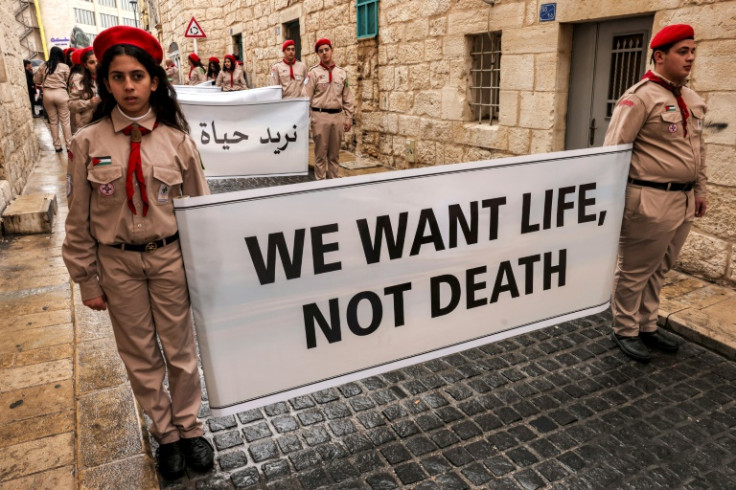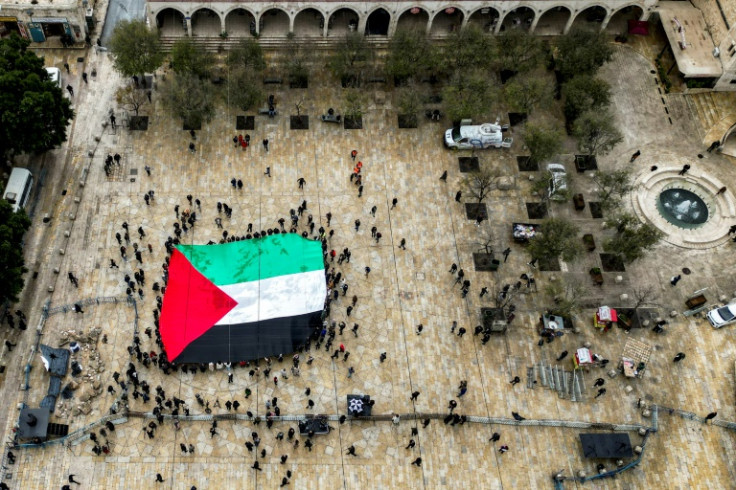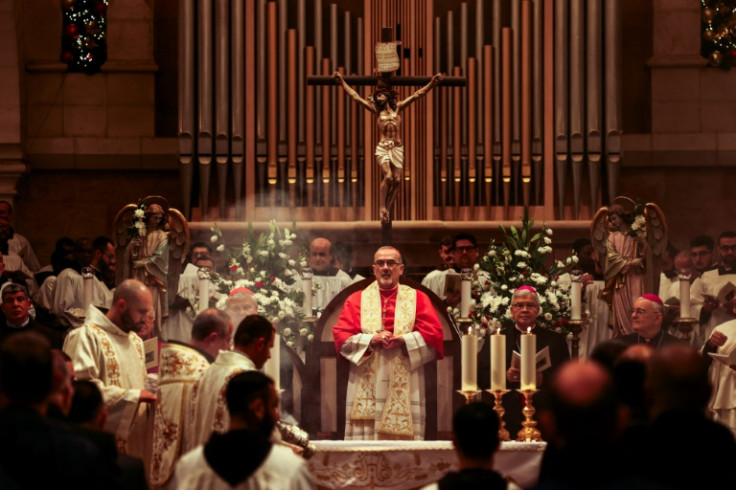
Sadness over the war in Gaza subdued the holiday cheer in Bethlehem on Christmas Eve, when the biblical town would usually be decked out in festive finery.
There was no revelry on Sunday, with few worshippers or tourists on the streets of the Palestinian town in the occupied West Bank, which according to Christian tradition was the birthplace of Jesus Christ.
Celebrations in the Holy Land have mostly been cancelled in solidarity with the people of Gaza, who are living through the deadliest war ever to engulf the besieged Palestinian territory.
"A lot of people are dying for this land," says Nicole Najjar, an 18-year-old student in the city's deserted Manger Square.
"It's really hard to celebrate while our people are dying."
A work of art evoking the tragedy of the war has been installed on the ground opposite the Church of the Nativity, taking the place of the life-size nativity scene and colossal Christmas tree that would normally be there.
On the building next door, a large banner reads: "Stop the genocide, stop the displacement, lift the blockade."
War broke out when Hamas fighters attacked Israel on October 7 and killed about 1,140 people, mostly civilians, and seized 250 hostages, according to an AFP tally based on Israeli figures.
Israel has vowed to eliminate Hamas in response and its military campaign, which has included massive aerial bombardment, has killed 20,424 people, mostly women and children, according to Gaza's health ministry.
In the Hamas-ruled Palestinian territory, an estimated 1,000 Christians have taken refuge in churches.
Last week, a mother and daughter were killed by an Israeli sniper inside the Church of the Holy Family in Gaza City, according to the Latin patriarch of Jerusalem, Pierbattista Pizzaballa.
Pizzaballa addressed the people of Gaza during midnight mass.
"We won't abandon you," he said at the Church of Saint Catherine.
"Their suffering ceaselessly cries out to the whole world," he said.
"Thousands of people have been deprived of their basic needs; they are hungry, and they are even more exposed to incomprehensible violence."
In normal years, a festive parade wakes the city up with bagpipes and tambourines.
But this year, people took to the streets silently.
"We want life, not death," proclaimed one of the banners carried by children through the streets.
In the morning, a huge Palestinian flag was unfurled in Manger Square, held at either end by Christians and Muslims.
"This year is different from all the others, it's a year of sadness, grief, destruction, deprivation and loss," says Mervat Murra, 50, a fashion designer from Bethlehem.
Near Manger Square, the Giacaman family opened their shop selling nativity scenes and other religious objects for the first time in 11 weeks.
"During Covid, we had two bad years, but that's nothing compared to this," says Amir Giacaman, 29.
The hostilities in Gaza have spread to the West Bank, a Palestinian territory occupied by Israel since 1967, where more than 300 Palestinians have been killed since 7 October by Israeli soldiers or settlers.
"We don't feel like celebrating while Gaza is suffering genocide and even here in the West Bank, we mourn young people killed by the Israelis and others detained every day," Mitri Raheb, pastor of a Lutheran church in Bethlehem, tells AFP.
"All we want for Christmas is a lasting ceasefire to put an end to this atrocity," he says.
"Bethlehem gave Jesus to the world. It's high time the world gave peace to Bethlehem and Gaza."










